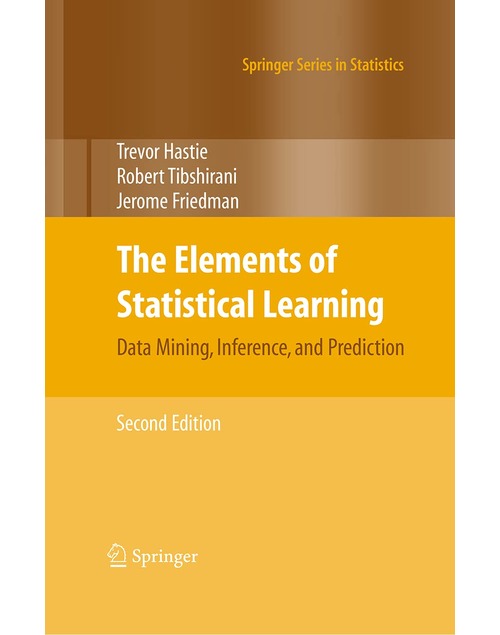The Elements of Statistical Learning: Data Mining, Inference, and Prediction is a widely regarded textbook in data science, machine learning, and statistics. Written by Trevor Hastie, Robert Tibshirani, and Jerome Friedman, this book is considered a must-have for both beginners and seasoned professionals. It covers a vast range of statistical learning topics with mathematical rigor, providing clear explanations and real-world examples that illustrate complex concepts.
This hardcover edition is highly valued for its durability, making it a lasting addition to any professional’s library. In this guide, we explore the features of The Elements of Statistical Learning, its popularity, and why investing in the hardcover format is ideal.

Book Overview
First published in 2001, with subsequent revisions to incorporate the latest techniques and technologies in statistical learning, The Elements of Statistical Learning introduces readers to foundational concepts in statistical modeling. It bridges the gap between traditional statistical techniques and machine learning methods, making it an essential resource for understanding how data-driven predictions are made.
The book’s detailed content includes topics such as:
- Linear Methods for Regression and Classification: These are foundational methods for understanding how variables interact in data. The book covers regression models, logistic regression, and linear discriminant analysis, with real-life examples for practical applications.
- Model Assessment and Selection: Model selection is critical in the field of data science, and the book provides in-depth coverage of techniques like cross-validation and the bootstrap method, guiding readers on how to choose and evaluate models effectively.
- Neural Networks and Support Vector Machines: These advanced methods are integral to machine learning. Neural networks are foundational to modern AI and deep learning, and support vector machines are powerful tools for classification. The authors discuss these models with clear illustrations and explanations, making complex topics accessible.
- Unsupervised Learning and Clustering: Unsupervised learning is a key area for identifying patterns in data without labeled responses, and this book covers clustering techniques like K-means, hierarchical clustering, and principal component analysis (PCA).
- Ensemble Learning: Techniques like bagging, boosting, and random forests, which are crucial for improving predictive performance, are discussed. These methods allow for the combination of multiple models to achieve better predictions than a single model.
Key Features of the Hardcover Edition
The hardcover format of The Elements of Statistical Learning offers several benefits:
- Durability: With frequent reference to specific chapters and sections, a hardcover copy withstands repeated use over time, making it ideal for students, educators, and professionals.
- Visual Appeal and Structure: The high-quality paper and professional design enhance the reading experience, with clear typesetting and well-organized diagrams. This is particularly helpful for statistical and graphical content, as clear visuals are crucial to understanding complex models and algorithms.
- Collectibility: Owning the hardcover edition adds value to your library. For students and professionals alike, having a permanent, durable edition ensures that the book will remain a reliable resource throughout your career.
Why The Elements of Statistical Learning Remains Essential
The book’s comprehensive approach and accessible language make it a cornerstone in the fields of statistics and machine learning. Unlike many specialized textbooks, The Elements of Statistical Learning balances theory with applications, making it useful for both academic study and real-world data analysis. Here are some reasons why this book remains relevant and essential:
- Foundation in Theory and Application: It provides both theoretical insights and practical techniques, ensuring readers develop a balanced understanding. This dual approach equips readers to both build and interpret models effectively.
- Cross-Disciplinary Appeal: Although primarily a statistics book, it is equally valuable for professionals in computer science, bioinformatics, economics, and engineering, as it covers statistical principles that are foundational across various data-heavy disciplines.
- Evolving with the Field: With the integration of newer statistical and machine learning methodologies, the book has adapted to technological advancements. Later editions incorporate recent techniques, making it a relevant resource even as the field evolves.
- Authors’ Expertise: Hastie, Tibshirani, and Friedman are leading figures in statistical learning and have contributed significantly to the development of models that are now industry standards. Their expertise offers readers insights that are academically rigorous yet accessible.
Where to Buy the Hardcover Edition
For those looking to invest in the hardcover edition, several online platforms offer it for sale, including:
- Amazon: Amazon often provides competitive pricing on both new and used copies of the hardcover edition. Check for discounts, especially during seasonal sales.
- Barnes & Noble: Known for a wide selection of academic texts, Barnes & Noble frequently stocks this title, both online and in select stores.
- Direct from the Publisher (Springer): Purchasing directly from Springer, the publisher, can sometimes include additional resources or discounts for educators and students.
Additionally, some academic retailers may offer discounts to students and faculty, so it’s worth exploring these options if you are affiliated with a university. other book Mind Over Mood books / Research Design 6th Edition
Final Thoughts
The Elements of Statistical Learning in hardcover is a worthwhile investment for anyone serious about mastering statistical learning and data analysis. Its durability, quality, and comprehensive content make it a valuable asset, whether for personal study or professional development. This edition is more than just a book; it’s a long-term resource that evolves with its reader, from foundational learning to advanced applications, solidifying its place as a critical resource in the modern data-driven world.
